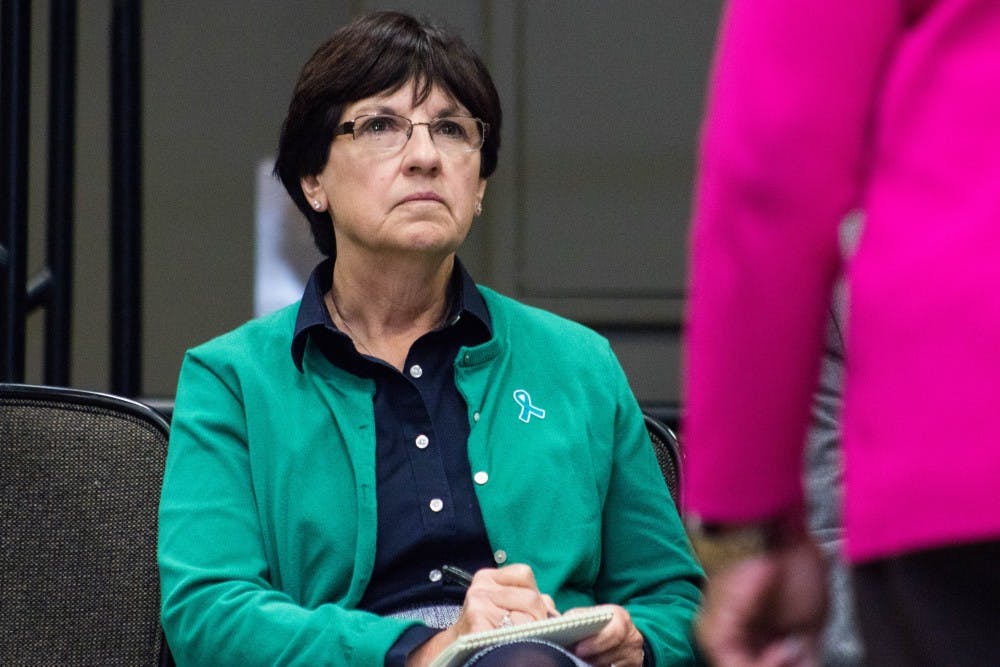On Sept. 17, the listening phase of the MSU presidential search process began. After nearly a month of input sessions being held across campus, the phase has ended and the next step of the process has begun.
The two final input sessions were open to the public and were held on Oct. 10 and Oct. 11 in the Kellogg Center. Many notable people from the MSU community were in attendance, including representatives from Reclaim MSU and Board of Trustee candidates Dave Dutch and Mike Miller.
At both open forums, the crowd was made up of around ten members of the community and multiple members of the presidential search committee.
"I was hoping to see a large group here," Andaluna Borcila, James Madison professor and a member of Reclaim MSU, said. "I’m disappointed that not many people showed up, and it has to do with many things. The other session that I went to wasn’t very big either. One of the things I think this has to do with is that people feel or think that their voice doesn’t really matter.”
The next step of the presidential search process is compiling all of the notes taken at the input sessions and posting them onto the presidential search's official website. Trustee Melanie Foster, co-chair of the presidential search committee, said the committee's note-taker has a format of condensing them so that they're consistent, and they will be posted sometime next week.
“It’s been terrific to get to know so many individuals and hear from so many individuals," Foster said. "I think it's important for this search that we went through this.”
Trustee Dianne Byrum, the other co-chair of the committee, said that after the notes are compiled, the committee will begin writing the position description. The position description will become the MSU president job posting, and Byrum said the candidates will be able to apply around the second week of November.
Members of the public will not be involved with the second phase of the presidential search process. It will be in consultation with the search firm they've chosen, Storbeck/Pimentel & Associates, and Teresa Sullivan, the former president of University of Virginia who was hired to advise the co-chairs during this process.
The Board of Trustees will ultimately decide who the permanent university president will be. Dave Dutch, who is running for a position on the board in the upcoming election, said this was one of the reasons why he attended the session.
“I’ve gotten my own input as I’ve gone around and I wanted to share that," Dutch said. "I’ve talked to thousands of people all through the state. If I become a trustee, and I hope I do, the next group of trustees will select the president, and I think that’s a big part of this, just getting the input from the interested parties.”
When asked about the qualities, characteristics and criteria desired in a new MSU president, Dutch told the committee that, although the candidate doesn't have to be a business person, they need to be someone comfortable working with large budgets, endowments and salaries.
“This is a complex university. We want someone who’s done it before at some level or somehow, and has gone through a cultural transformation," Dutch said. "We are going through a cultural transformation. I think it’s imperative ... that they’ve done this before.”
Betsy Riley, a Ph.D. candidate representing Reclaim MSU, said, although the committee shouldn't avoid considering candidates who are business leaders, they should "be very careful" if they were to choose one.
"Businesses are notorious as some of the absolute worst failures of addressing sexual assault and harassment in the entire country," Riley said.
Riley attended four presidential search input sessions. At both of the open forums, she addressed what she told the committee was the "elephant in the room" — toxic, pervasive rape culture on campus.
“That’s something that the president is going to have to make number one priority for the next decade," Riley said. "No other campus in the entire United States of America has satisfactorily conquered the issue of toxic, pervasive sexual assault and harassment. No other university has done it. We at Michigan State, we’ve got the motivation after Nassar, we’ve got the momentum after Nassar, to do this. But we’ve got to have leadership that is willing to take on this challenge.”
Support student media!
Please consider donating to The State News and help fund the future of journalism.
She started off her public comment by saying, "I do not trust this process", and continued to reference Reclaim MSU's official statement about the presidential search process in both open forums.
“If this new president does not see pervasive, toxic rape culture as the single number-one priority for the entirety of her tenure here, then this whole problem is never going to be solved," Riley said. "And MSU is going to be the Nassar school forever.”
Miller, the other candidate running for one of the two open spots on the Board of Trustees, told the committee that the new president needs to work with alumni to raise money, improve the endowment and support future opportunities for the university. He also spoke out about his daughter, who was treated by ex-MSU doctor Larry Nassar.
“Larry Nassar is not Michigan State University. He was a bad guy. And he is gone, thanks to a lot of people who worked hard," Miller said. "I know it’s not over yet, but he’s gone, and he’s not Michigan State. Michigan State is a culture. I would say that everyone sitting here and everyone in this room who has anything to do with Michigan State is part of the culture. And it ain’t all bad.”
The presidential search process is a year-long process. After the position description is written, identifying candidates and the initial interviews will begin in November, and final interviews with the MSU Board of Trustees are set to occur between February and May.
The new president of MSU will be announced in June of 2019.
Discussion
Share and discuss “Listening phase of the MSU presidential search process comes to a close” on social media.







